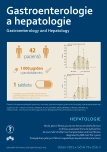Editorial
Authors:
Skladaný Ľ.
Authors‘ workplace:
Slovak Medical University, F. D. Roosevelt University Hospital, Banska Bystrica
; HEGITO (Division of Hepatology, Gastroenterology and Liver Transplantation), Department of Internal Medicine II
Published in:
Gastroent Hepatol 2022; 76(2): 87
Category:
Editorial
Dear readers of the spring liver issue of Gastroenterology and Hepatology,
before you immerse yourselves in the science of the following pages, I would like to give you some food for thought from the realm of humanities. A burning question has been posed to European hepatology and gastroenterology by the war raging just around the corner in our dear old Europe. The question is as old as humankind and, as we have just learned, the answers of we humans are as antipodal as ever.
On 21 March this year, Professor Thomas Berg of Germany, the president of EASL convened a meeting of the presidents of the liver societies of certain countries bordering Ukraine: Poland, Slovakia, Hungary, Moldova and Romania. On behalf of EASL, Professor Berg arbitrated a text of declaration in which EASL condemned the war in Ukraine and supported the peoples of and colleagues from Ukraine. The Declaration was unanimously voted through, together with financial support for Ukraine in the form of donations via donate.unhcr.com/en/ukraine.
However, some of the leaders demanded that EASL assume a much more radical position: to expel Russian hepatologists from the professional community altogether and not allow them to attend any EASL events, including the International Liver Congress 2022. Various official statements of position were evoked – a mild statement from the UEG on one hand and, a more radical statement from the ESCMID on the other; together with names of science not to be forgotten or thrown out of the window for their ethnicity or nationality. Heated discussion has followed for days on end via the internet.
Caught unawares by this millenia-long dilemma operating in hepatology and gastroenterology, I decided to forward it to you – gastroenterologists and hepatologists from the region with intimate historical experience – in order to try to scrutinise together our feelings as compared to our thoughts and knowledge. What side are we on? In our unquestionable quest for a better world, which evidence-based approach do we consider to be a more effective way to lasting peace? And, for that matter, is there any high-quality evidence to support our standpoint – a kind of a meta-analysis of therapeutic approaches to evil that Czech and Slovak hepatology and gastroenterology could leverage? Literature on the topic is voluminous and opinions vary.
An eye for an eye
A tooth for a tooth
Collective guilt
Viktor E Frankl
Hannah Arendt
I have a dream
Socrates
I hope that when you read Gastroenterology and Hepatology, you will be unimpeded by anything other than your thoughts.
Yours sincerely
Ľubomír Skladaný, MD, PhD
hepatology coeditor
Labels
Paediatric gastroenterology Gastroenterology and hepatology SurgeryArticle was published in
Gastroenterology and Hepatology

2022 Issue 2
- Possibilities of Using Metamizole in the Treatment of Acute Primary Headaches
- Metamizole at a Glance and in Practice – Effective Non-Opioid Analgesic for All Ages
- Metamizole vs. Tramadol in Postoperative Analgesia
- Spasmolytic Effect of Metamizole
- The Importance of Limosilactobacillus reuteri in Administration to Diabetics with Gingivitis
-
All articles in this issue
- Kvíz z klinické praxe
- Risk of liver fibrosis in patients undergoing surgical treatment of hip trauma
- Liver transplantation for hepatic PEComa mimicking hepatocellular carcinoma
- Ketoanalogue of essential amino acids in patients with inflammatory bowel disease (IBD) and chronic kidney disease (CKD) in preparation for kidney transplantation
- Recommended procedure of the Czech Society of Hepatology for the diagnosis and treatment of acute porphyrias – update 2022
- Oral vitamin B12 therapy supplementation in patients with ileo-colonic resection for Crohn’s disease
- Low-volume polyethylene glycol ascorbate solution (PLENVUTM) – a new generation of intestinal cleansers with high efficiency and good tolerance
- Tofacitinib in the treatment of ulcerative colitis – personal experience
- External meeting of the CGS ČLS JEP committee in České Budějovice
- The selection from international journals
- Prim. MUDr. Štefan Šafár (28. 7. 1938 – 19. 3. 2022)
- Life anniversary of the leading Slovak gastroenterologist Mária Zakuciová
- Správná odpověď na kvíz
- Budějovice gastroenterologické 2022 6.–7. dubna 2022
- Kreditovaný autodidaktický test: hepatologie
- Primary biliary cholangitis (PBC) – Czech Society of Hepatology guidelines for dia gnosis and treatment – update (2022)
- Cirrhosis-associated immune dysfunction (CAID) – causes, phenotypes and consequences
- De novo non-alcoholic fatty liver disease after liver transplantation and liver fibrosis diagnosed by magnetic resonance over 2 years
- Hepato-renal manifestation of untreated severe hypothyroidism
- Liver function test abnormality in paediatric patients with Covid-19 – a single-centre study in the south of Iran
- Editorial
- Gastroenterology and Hepatology
- Journal archive
- Current issue
- About the journal
Most read in this issue
- Risk of liver fibrosis in patients undergoing surgical treatment of hip trauma
- Ketoanalogue of essential amino acids in patients with inflammatory bowel disease (IBD) and chronic kidney disease (CKD) in preparation for kidney transplantation
- Liver transplantation for hepatic PEComa mimicking hepatocellular carcinoma
- Oral vitamin B12 therapy supplementation in patients with ileo-colonic resection for Crohn’s disease

